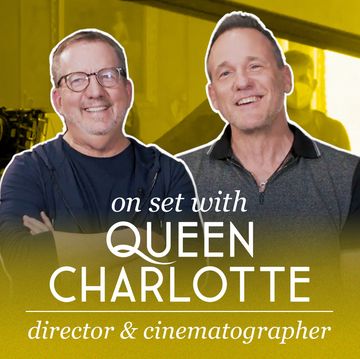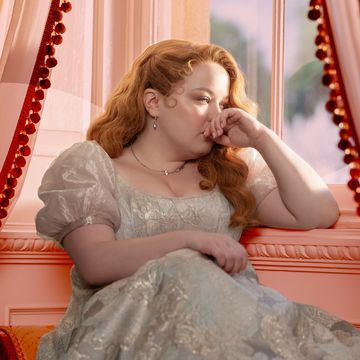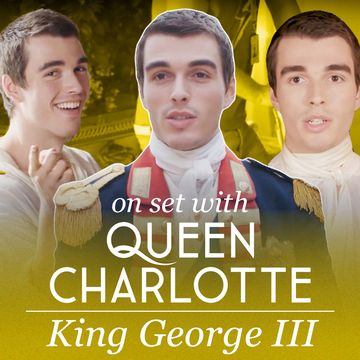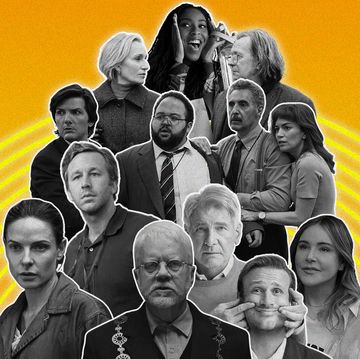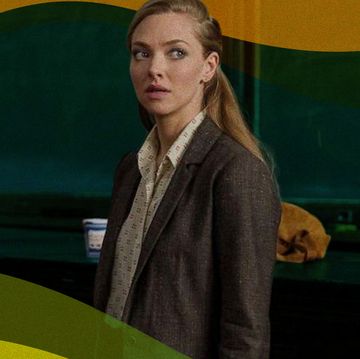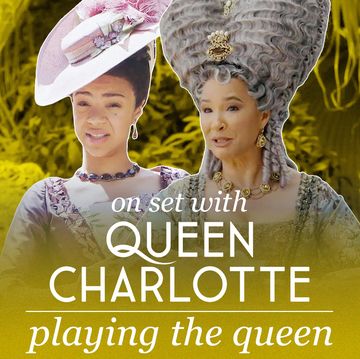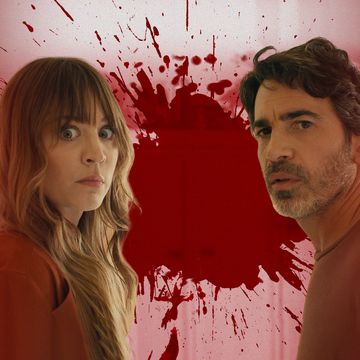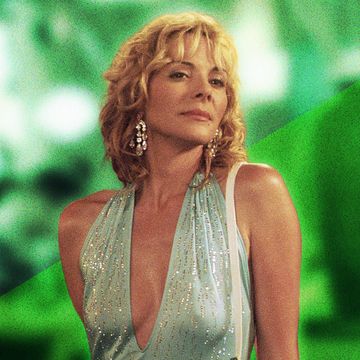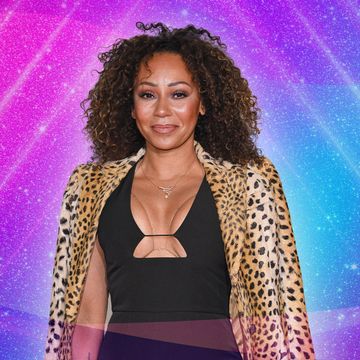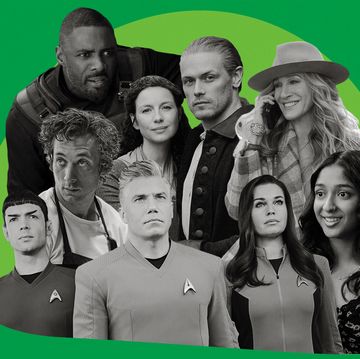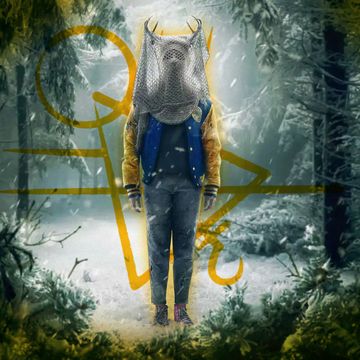Julia Quinn began writing historical romance novels by accident. She’d been ruminating on what to do and who to be during her senior year as an art history major at Harvard University when she tucked into a pint of Ben & Jerry’s and picked up a book. She ate it up — the ice cream and the book — and it wasn’t that she thought she could do better, as goes the typical turn-of-phrase by romance novelists, she simply wanted more. Thus began her 26-year career. She’s since published 38 historical romance novels that have reached the New York Times Best Sellers list 19 times, been translated into 29 languages and have sold millions of copies worldwide. Twelve of those novels have been the Bridgerton series.
The day it was announced that Bridgerton was one of Shonda Rhimes’ first projects for the new programming partnership between Shondaland and Netflix, Quinn was far from the hustle and bustle of Hollywood. The author, who normally would have been at the Romance Writers of American annual conference, which she has attended almost every year since she began writing historical romance in 1994, was on a family holiday in Iceland. Though Quinn wasn’t in attendance at the conference, the buzz was audible and the news rippled through the romance-writing world.
“Everyone was in shock in the best kind of way,” says Quinn. “There was no blueprint for [film and television] adaptation in our genre. There’s been maybe a few Hallmark movies, but only for contemporary romance.”
Compared to other types of historical romance, which focus a lot on description and “showing rather than telling,” Regency-era narratives play to Quinn’s strengths as a writer — fast, witty, quippy dialogue. Plus, she thinks it’s the sweet spot for period romance.
“It’s far enough in the past that it’s imbued with a fairytale-like quality in ways that something set in the 20th century can’t be,” she explains. “And it’s close enough that people behaved in ways that were still fundamentally very similar to modern people.”
When it comes to translating book-to-screen, Quinn’s scarcity of description gave the perfect blank canvas for showrunner Chris Van Dusen to create the world of Bridgerton the series from the bottom up, while her scintillating pages of dialogue gave the screen characters a sturdy foundation.
Narrated by Lady Whistledown’s Society Papers (voiced by Julie Andrews), the first season of Bridgerton — adapted from Quinn’s The Duke and I — takes place in Regency London where status is everything and marriage to the right person is a high stakes game. And with the premiere set for December 25, Quinn spoke to Shondaland about seeing the transformation of her stories onto the screen, her thoughts on the already established fandom surrounding the books and what scene she really wished made it into the show.
Plus, be sure to catch Quinn’s live interview for Shondaland’s Instagram Live Author Series. Head to the @byshondaland Instagram page on December 10 at 11:00 am PT to see Quinn chat about her books and the new Bridgerton series.
VALENTINA VALENTINI: When did you first find out that Shonda Rhimes was interested in adapting your books?
JULIA QUINN: I remember it really well, actually. It was about four years ago, and I was at my favorite Starbucks in my regular spot where I like to sit at the bar — I’m very Princess and the Pea and I like to be at just the right height. My friend, Elizabeth, another regular there, was sitting next to me and I got a call from my agent, which isn’t that uncommon. He asked me if I’d heard of Shonda Rhimes and, not believing he was asking me that, I was like, “Yeeeeeaahhhh.” And he explained how someone at ICM had called him to ask if the Bridgerton series rights were available and if I would be interested in selling them. And of course, I said yes! I just assumed if it were Shonda Rhimes calling, that anybody would be interested in selling the books!
VV: From there, how involved were you with the development of the show and the scripts?
JQ: As a consultant on the show, I wasn’t involved in crafting the adaptation. That’s actually one of the first things that people ask you, both when you go into the negotiation process for optioning and afterward — are you willing to hand over creative control? Or did you give up creative control? And you know, when they asked me, I said take it. And that’s because it was Shonda Rhimes! I’m not going to tell Shonda Rhimes how to make television, you know? She’s basically the smartest, most successful person out there and I couldn’t imagine doubting her in any way. And on a more practical level, I didn’t want to do anything to risk the deal. I wanted to be the easiest, happiest, team-player author you could imagine. And yea, I probably wouldn’t have been so willing like that if it were someone else, I might’ve been more nervous, but I just trusted her implicitly.
VV: On any level at all, was it scary to let someone else take your story and mold it to be their own?
JQ: I don’t know if scary is the right word. I was definitely nervous — no, that’s not the right word either. I was just kind of…
VV: …anxious?
JQ: Yes. A little anxious, just because I wanted to see what was going to happen. It was a really long process to get from there to here, so I often would just wonder when they were going to show me a script. When they did get me that first script, I just wanted to be alone and go off in a corner and read by myself — that’s just my process. And before I read it, I was on a call with Betsy Beers, and she sort of wanted to warn me a little bit, like that it doesn’t open the way it does in the book and there were some changes here and there and that they needed to educate the viewer on what a romance novel is and all these things. And I knew it was a different medium, so I expected all that. I was prepared to have it feel different, but when I got through it, I just went, “Wow, that was exactly the right way to do this. And I wouldn’t have thought of it.” From a writing standpoint, it’s been fascinating to see the adaptation.
But no, it wasn’t scary. I’ve never been one of those authors who lives and breathes my characters. When I shut the computer at the end of the night, they’re gone for the night, which I think is disappointing for some readers.
VV: This is your first adaptation, right?
JQ: Yes, and it’s very exciting not just for me, because I think it’s a first for historical romance in any major way. As a genre, we don’t get adapted. There’s Outlander, which is romance-adjacent — we like to claim Diana Gabaldon to a degree — but it is a little bit different. I’ve often said that it’s no surprise that Shondaland would look past prejudices the romance genre has and say, “Hey, this a great story,” because they’re all about storytelling. But I think people really haven’t looked to romance novels as viable adaptations in part because there is some stigma around them — they’re by women, for women, primarily edited by women.
More specifically, I think historical romance has been passed over because of the expense. Historical romance is going to be expensive to do, and unlike most contemporary stories, if you wanted to do a big period piece, you could go with a classic with prestige attached to it. This may come across the wrong way, but I’ll be honest and say that while I’m really excited for me, I’m also really excited for the genre. I hope that it will introduce more people to it and maybe pave the way for more adaptations.
VV: Books and the screen are two very different mediums. What do you think the Bridgerton series will bring or add to what’s already been established in Bridgerton the books?
JQ: It brings so much! I’ve always understood that they’re two different mediums, but what didn’t really occur to me so much was the sheer number of people involved in making a show or a movie. At its heart, a book is coming from my imagination, from my lived experiences. With a series, you’ve got hundreds of people able to bring their imagination and lived experiences to it. It expands the world so much in a way that I’m not able to as a single human being. Also, my romance novels are very tightly focused on two main characters (in this case, Daphne Bridgerton and Simon Basset). With the series, they’re able to expand on subplots and secondary romances. Like we get to see so much more of Eloise [Claudia Jessie] and Penelope [Nicola Coughlan] than you do in the first book, which I think is fabulous because I love those characters. I went on to write books about them, but I love that the audience will get to know them more now.
Also, I’m not a terribly visual writer. People have asked, “Does it look the way you imagined it?” And I don’t really have an answer because I didn’t imagine it that well. Now I have this to see — it’s filled out all the empty spots in my imagination, which is really exciting.
VV: What about the characters, specifically — did you ever have an idea of what they looked like?
JQ: When I visited the set for the first time, I was writing my most recent novel. It’s a Bridgerton prequel and has some of these characters as children in it. When I met Luke Newton, who plays Colin Bridgerton, I told him that I was writing a book when he’s a baby. I asked him if he had any baby pictures, and he called his mom — or his mum, I should say — and she sent him. Now I have these baby pictures of him, and for the first time, I have a really clear picture of this character.
VV: Fans of the Bridgerton books are a pretty rabid bunch — how are you expecting them to respond to the show?
JQ: I think most of them are going to love it. I would hope that most are taking their cue from me. I’ve seen some who have said they’re nervous — I get that. I’m nervous, too. But to me, that’s a compliment. What’s not a compliment is when people say they’re not even going watch it, for whatever reason, like they don’t like the casting — and some of that has racial overtones — or that someone looks too old or too young or Daphne’s hair is too light or that the teaser trailer doesn’t have the right tone. And I feel like saying, “You haven’t even seen them in action!” And as for the teaser trailer, at least to my understanding, it isn’t necessarily out there trying to reassure current readers of the series; it’s to help people who don’t know anything about it. Though, in general, I do feel like readers are going to love this. And I’ll just say, it’s not a word-for-word adaptation and it shouldn’t be. But the characters and the plot are absolutely true to who and what they were in the book, and remarkably so.
VV: Was there anything that didn’t make it into the show that you really wished had?
JQ: There was one thing which they managed to sneak in a bit sideways. The scene in the book when Simon pays a call on Daphne for the first time and he brings flowers for her and for her mother and Daphne thinks, “Oh I bet nobody’s brought my mom flowers since my dad died.” That was a really special moment that came from my own life. And there aren’t that many books where I do pull directly from my own life. But many years ago, when I was living in Connecticut and my husband was still a medical student — I don’t even know if we were married at that point — I happened to be in Colorado with family on Valentine’s Day. This was before the internet where it’s really easy to order flowers online, so he called my sister to get the number of a florist near us. She thought it was so sweet and helped him out. On Valentine’s Day, he sent me flowers, but he also sent flowers to her, to my mother, and to my grandmother. My bouquet was the biggest, of course. And everyone thought it was so sweet, but the reaction from my grandmother… My grandfather had passed away a few years earlier and he had been somewhat diminished for years already. She was just like a little girl, totally lit up when she got those flowers. So, I did let Chris [Van Dusen] know that that was a really special moment, and they managed to work in a line where Daphne says that Simon brought flowers for the both of them. I guess that’s the moment I would have liked to see, Violet receiving the flowers.
VV: What was it like being on set?
JQ: For me, it was surreal, but not for the reasons you’d think. It wasn’t just because these are my characters or some of those words were mine, again, it was just that I couldn’t believe how many people there were. It’s the craziest experience to see something that started out as just me at my computer, now has hundreds of people involved. On my second visit, it was just after my 50th birthday and they had a cake and flowers, and it was so sweet. To quote Julie Andrews, “It was practically perfect in every way.”
Valentina Valentini is a London-based entertainment, travel and food writer for Vanity Fair, Vulture, Variety, Thrillist, Heated, and The Washington Post. Her personal essays can be read in the Los Angeles Times, Longreads, and her tangents and general complaints can be seen on Twitter at @ByValentinaV.
Get Shondaland directly in your inbox: SUBSCRIBE TODAY





